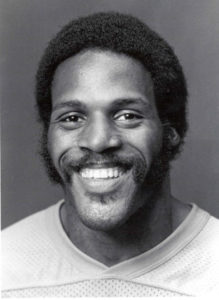Joe Delaney
Louisianan Joe Delaney played with the Kansas City Chiefs after a record-setting turn at Northwestern State in Nachitoches.

Courtesy of The Louisiana Endowment for the Humanities
Joe Delaney. Unidentified
Originally regarded as too small for the position, Joe Alton Delaney was bound for stardom as a running back for the Kansas City Chiefs of the National Football League (NFL) for two seasons in the early 1980s, following a record-setting turn at Northwestern State University in Natchitoches. Delaney’s budding professional career never fully blossomed, however; he drowned while attempting to rescue three boys struggling in deep water at a Monroe amusement park in 1983 when he was only twenty-four.
Born on October 30, 1958, in Henderson, Texas, Delaney was one of eight children. His father was a cattle-truck driver, and the family moved to Haughton, Louisiana, near Shreveport, when he was a boy. He graduated from Haughton High School in 1977 and spurned offers from major college football programs, including Texas, Oklahoma, and Louisiana State University, to stay close to home at Northwestern State. The decision reflected his nature as a homebody who was dedicated to his roots throughout his life, even after he became a National Football League (NFL) star.
Delaney stood five feet ten inches tall and weighed 184 pounds. The Northwestern State coaching staff promised the undersized Delaney he would be able to play wide receiver, but when the team suffered a slew of injuries at the running back position, he volunteered to step in in the backfield if needed. From there Delaney went on to a record-breaking, All-American career as a running back for the Demons, accumulating 3,047 yards rushing and thirty-one touchdowns from 1977 to 1980. He also was a member of the Northwestern track team that won the NCAA 400-meter relay in 1981.
Picked by Kansas City in the second round of the 1981 NFL draft, Delaney rushed for 1,121 yards in his first season and was named conference Rookie of the Year by United Press International. His playing time during the 1982 season was limited by an eye injury and a players’ strike; he rushed for 380 yards in the abbreviated eight-game season.
Despite the financial rewards of his NFL contract, Delaney chose to build a modest house in Ruston, near his widowed mother’s home. Around Haughton, Delaney was known as “Joe D”—a man who was always willing to tutor children in athletics and life, and who once paid the funeral expenses of a former teacher whose relatives couldn’t afford the services.
On June 29, 1983, a few weeks before the start of preseason training camp, Delaney—who possessed only rudimentary swimming skills—quickly jumped into a manmade pond at Critter’s Creek, an amusement park in Monroe, to save three young boys who had waded too far out into the surprisingly deep, watery pit and were screaming for help. One of the boys managed to swim to safety, but Delaney and the other two youths drowned. Delaney was feted as a hero by everyone from his high school football coach to President Reagan, who posthumously awarded him the Presidential Citizens Medal.
In an award ceremony held in the Haughton High School gymnasium on July 15, 1983, Vice President Bush represented Reagan and presented the medal to Carolyn Delaney, Joe’s widow, and Eunice Kennon, the late athlete’s mother. Bush called Delaney “larger than life … a true hero,” then read a letter from the president stating that Delaney “has surely earned his place in heaven for having sacrificed his life for those three boys.”
At a memorial service, a stream of influential figures in Delaney’s life testified to his boundless concern for the welfare of others, his generosity, and his humble, hard-working nature. Former Kansas City Chiefs head coach Marv Levy told the audience, “Joe was a person who was genuine and honest right to the core of his being,” while Delaney’s coach at Northwestern State, A. L. Williams, said, “People ask me, ‘How could Joe have gone in that water the way he did?’ And I answer, ‘Why, he never gave it a second thought, because helping people was a conditioned reflex to Joe Delaney.’”
Haughton High School retired Delaney’s prep jersey number and created a park in his honor. At Northwestern State, his jersey number was retired, the football team’s annual spring intrasquad scrimmage was named the Joe Delaney Bowl, and the Joe Delaney Memorial Leadership Award was inaugurated for each season’s team captains. He was inducted into the College Football Hall of Fame in 1997 and posthumously bestowed with the NCAA Award of Valor in 1984. The Kansas City Chiefs, meanwhile, included Delaney in the team’s Hall of Fame and its ring of honor at Arrowhead Stadium, and although his Chiefs jersey number isn’t officially retired, No. 37 hasn’t been worn by any Chief since his death.
In a lengthy profile for Sports Illustrated months after his death, writer Frank Deford detailed Delaney’s roots in and eternal connections to his hometown of Haughton, his high school and college alma maters, and his Louisiana friends and family. Deford noted how Delaney, a humble, hard-working African American man who was dedicated to his community, helped unify his racially diverse hometown and the surrounding region, and he concluded the story by calling Delaney “a man who died a hero one hot summer’s day and, before that, had never put a spot on a human heart.”
